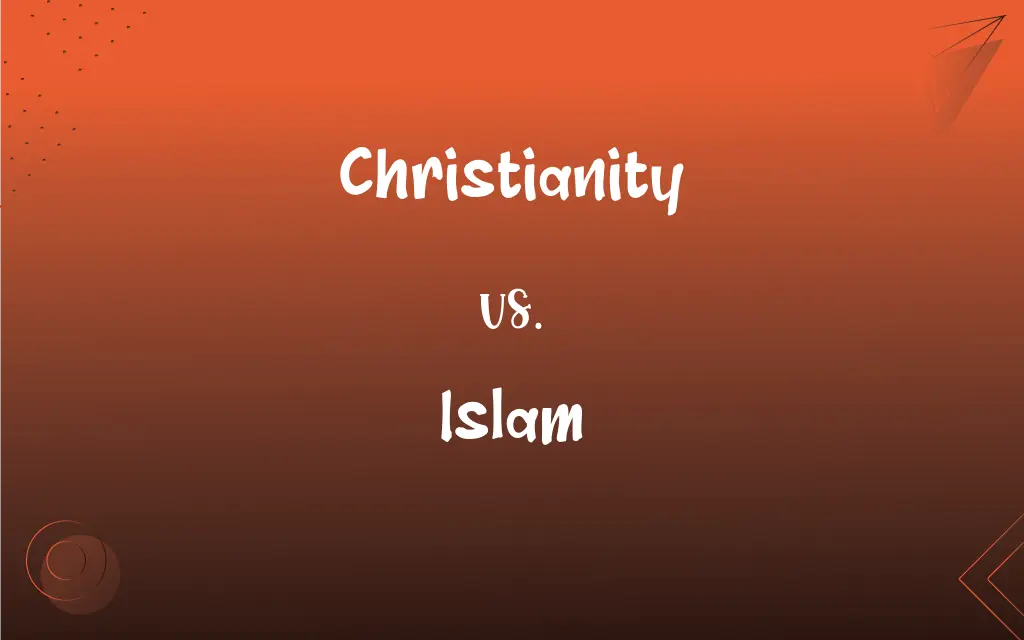Christianity vs. Islam: What's the Difference?
Edited by Aimie Carlson || By Harlon Moss || Updated on October 14, 2023
Christianity believes Jesus is God's son; Islam regards him a prophet. Both emphasize compassion, forgiveness, and an afterlife.

Key Differences
Christianity, originating in the early 1st century AD, believes in the Holy Trinity, asserting that God exists as three persons - the Father, the Son (Jesus Christ), and the Holy Spirit. Islam strictly adheres to the oneness of God (Tawhid), refuting any division of God’s nature.
Christianity emphasizes salvation through faith in Jesus Christ’s death and resurrection. Adherents believe that through Jesus, humans receive grace and eternal life. Conversely, Islam posits that salvation is attained through belief in one God and good deeds, following the Five Pillars of Islam.
In Christianity, the Bible, comprising the Old and New Testaments, is the sacred scripture. The New Testament chronicles Jesus' life, teachings, death, and resurrection. Islam reveres the Quran, believed to be the literal word of God (Allah) as revealed to Prophet Muhammad through the Angel Gabriel.
Christianity observes sacraments like baptism and the Eucharist as means of receiving God’s grace. In contrast, Islam does not have sacraments but rather rituals like daily prayers and fasting during Ramadan, which are essential acts of worship and pillars of faith.
Christianity and Islam have different dietary laws and guidelines for adherents. While Christianity’s directives on food can vary between denominations, Islam has clear, specific dietary laws, including the prohibition of consuming pork and alcohol.
ADVERTISEMENT
Comparison Chart
Divinity
Holy Trinity
Strict Monotheism
Prophet/Messiah
Jesus is God's son
Jesus is a prophet
Sacred Text
The Bible
The Quran
Path to Salvation
Faith in Jesus
Faith and Deeds
Rituals/Sacraments
Baptism, Eucharist
Five Pillars
ADVERTISEMENT
Christianity and Islam Definitions
Christianity
Christianity utilizes the Bible, a sacred text that includes the Old and New Testaments, as its holy scripture.
Followers of Christianity find moral and spiritual guidance in the Bible, applying its teachings to various aspects of life.
Islam
Islam is a monotheistic religion based on the teachings of the Prophet Muhammad as revealed in the Quran.
Many followers of Islam gather in mosques for communal prayers.
Christianity
Christianity emphasizes the concept of salvation and eternal life through belief in Jesus Christ.
In Christianity, Easter celebrates the resurrection of Jesus Christ, symbolizing victory over sin and death.
Islam
Islam is a civilization and socio-political structure historically spanning various countries and cultures.
The influence of Islam has shaped the architecture, law, and culture of numerous societies across the world.
Christianity
Christianity embraces diverse denominations, such as Catholicism, Orthodoxy, and Protestantism, each with distinct beliefs and practices.
Despite the diversity within Christianity, all denominations center their beliefs on the teachings and works of Jesus Christ.
Islam
Islam, comprising diverse sects like Sunni and Shia, has varying interpretations and practices among its believers.
Despite sharing core beliefs, Sunni and Shia Muslims in Islam have some distinct practices and historical perspectives.
Christianity
Christianity is a monotheistic religion based on the life and teachings of Jesus Christ.
Christianity has various denominations, each interpreting the teachings of Jesus Christ in unique ways.
Islam
Islam emphasizes submission to the will and laws of Allah (God) as a fundamental principle.
Adherents of Islam seek to live their lives in accordance with divine guidance.
Christianity
Christianity follows various rituals and practices, such as baptism and communion, to symbolize and affirm faith.
In Christianity, baptism symbolizes the cleansing of sin and the individual's entrance into the faith community.
Islam
Islam prescribes a way of life that encompasses both faith and practice, seeking to balance the spiritual and material aspects of existence.
Through observing the Five Pillars, believers in Islam engage in practices that reinforce their faith and ethical conduct.
Christianity
A religion based on the life and teachings of Jesus. Most forms of Christianity hold that Jesus is the son of God and is the second person of the Trinity, through whom humans may attain redemption from sin.
Christianity
Christians as a group; Christendom.
FAQs
What is the place of worship in Christianity?
Christians commonly worship in a church.
Where did Christianity originate?
Christianity originated in the early 1st century AD, with Jesus Christ and his disciples in Judea.
What is the central figure in Christianity?
Jesus Christ is the central figure, believed to be the Son of God and the Savior of humanity.
What are the major denominations in Christianity?
Major denominations include Roman Catholic, Orthodox, and Protestant.
What is Easter in Christianity?
Easter celebrates the resurrection of Jesus Christ from the dead.
What is the holy book of Christianity?
The Bible is the holy book of Christianity.
Who is the central figure in Islam?
The Prophet Muhammad is the central figure, considered the last prophet in Islam.
What is the holy book of Islam?
The Quran is the holy book of Islam.
Where did Islam originate?
Islam originated in the 7th century CE in Mecca, present-day Saudi Arabia.
Who is the spiritual leader in Christianity?
Different denominations have various spiritual leaders like priests, pastors, or bishops.
What is the place of worship in Islam?
Muslims worship in a mosque.
What is Ramadan in Islam?
Ramadan is a holy month of fasting, prayer, reflection, and community.
How is God referred to in Islam?
God is referred to as "Allah" in Islam.
What is the purpose of Hajj in Islam?
Hajj, a pilgrimage to Mecca, serves as a pillar of Islam, symbolizing unity and the believers' submission to Allah.
What are the sacraments in Christianity?
Common sacraments include Baptism, Eucharist (Holy Communion), and Confirmation.
How is salvation achieved in Christianity?
Salvation is commonly believed to be achieved through faith in Jesus Christ, repentance, and grace.
Who is the spiritual leader in Islam?
Imams lead prayers and sheikhs or scholars often provide spiritual guidance.
What are the Five Pillars of Islam?
The Five Pillars are Shahada (faith), Salah (prayer), Zakat (charity), Sawm (fasting), and Hajj (pilgrimage).
What is the Christian doctrine of Trinity?
Father, Son, and Holy Spirit.
What are the major sects in Islam?
The two major sects are Sunni and Shia.
About Author
Written by
Harlon MossHarlon is a seasoned quality moderator and accomplished content writer for Difference Wiki. An alumnus of the prestigious University of California, he earned his degree in Computer Science. Leveraging his academic background, Harlon brings a meticulous and informed perspective to his work, ensuring content accuracy and excellence.
Edited by
Aimie CarlsonAimie Carlson, holding a master's degree in English literature, is a fervent English language enthusiast. She lends her writing talents to Difference Wiki, a prominent website that specializes in comparisons, offering readers insightful analyses that both captivate and inform.































































